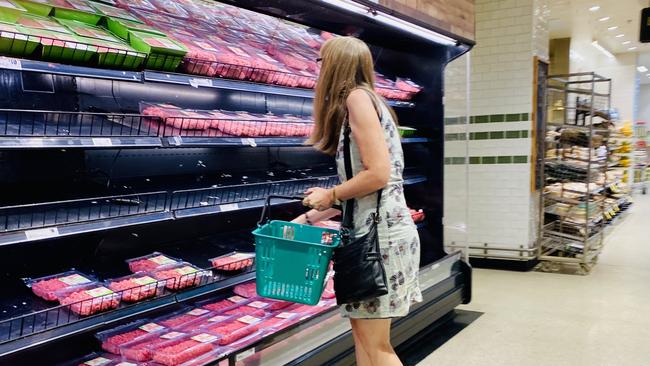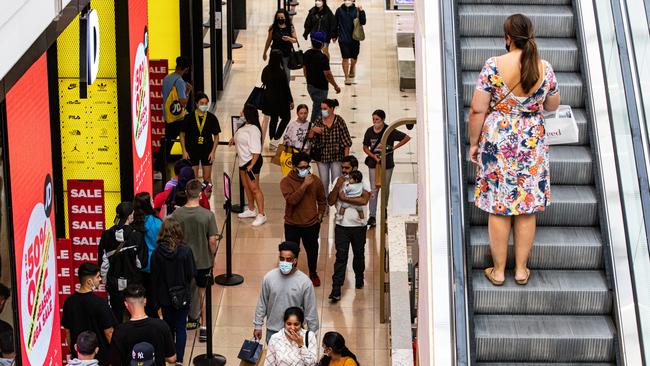Rise of the ‘value shopper’ as budgets are crunched is a threat and an opportunity for retailers
It’s getting tough out there as consumer cashflow is expected to sink by as much as 30 per cent and not all retailers will win in the bargain-hunting world.

The leaked internal sales figures this week from up-market department store David Jones not only pulled the curtain away from what was crashing sales at the national retailer but reflected a wider malaise now gripping the $400bn retail sector as the consumer hits the doldrums and goes on a purchasing strike.
As The Australian reported on Tuesday, David Jones hit sales declines of 10 per cent in early June compared with the same period last year and some of its stores across a number of states and cities experienced sales retreats of more than 30 per cent.
But this isn’t an isolated incident, and David Jones is not the only retailer suffering a shopper drought. A number of high-profile retailers in the discretionary space like Domino’s Pizza, Treasury Wine Estates, Maggie Beer foods, Baby Bunting, Michael Hill jeweller and fashion chain Universal Store confess to slowing sales and squeezed earnings.
Now a new chilling report tips that discretionary cash flow is expected to sink by as much as 30 per cent for some households in the wake of interest rate rises, elevated rents and a range of other cost of living pressures to transform the average consumer into a “value shopper” that will rattle many retailers.
Jarden analyst Ben Gilbert has declared the “value shopper is here” in his latest extensive report into the state of mind of the consumer and the retail sector, with a review of 28 leading ASX-listed retailers and how they are expected to fare in the changing economic environment.
The well-followed retail analyst says that retailer downgrades have already begun – led by companies like Treasury Wine Estates, Baby Bunting, Adairs, Universal Store and Domino’s Pizza – and that he expects earnings deterioration to be further compounded by rising costs, which has not been factored into 2024 consensus.
“It’s getting tough out there unless you sell food, flights or pharma,” Mr Gilbert said.
“The net is risk to earnings into fiscal 2024, which in our view could be material.
“Consumer spending has begun to slow, costs are rising and consumers are more actively seeking out value.
“We are seeing high frequency credit card data from ANZ and Westpac point to weaker spending, which is likely to slow further as disposable cash flows fall around 30 per cent for some households.”
Not surprisingly it is those households on fixed mortgages that are about to roll over to much higher variable rates that are expected to be most under stress and the most incentivised to search out value and bargains.
“It is the cohort that is families with mortgages that are going from fixed loans repayments to variable are those that are going to be hardest hit,” Mr Gilbert told The Weekend Australian.
“What it tells us is there is obviously some families that are going to see quite material reductions in their purchasing power and as a consequence these are the cohorts and groups that are probably going to be most focused on trading down or cutting back on spending.
“And I think May is one of the big months where you see this big fixed (mortgage) to variable (mortgage) roll. And obviously May has now coincided with some pretty material slowing in spending that we are seeing coming in all the data.”
Mr Gilbert said the implications for listed retailers are weaker demand as discretionary items are delayed or forgone, replacement cycles extended and cheaper options sought – eat at home versus eat out, own brand, cheaper alternatives.
“I think what we can see coming through now is people just want to be more discerning on where and how they‘re going to spend their money. So we’re seeing people shopping across more grocery stores, Aldi is seeing quite a resurgence in growth. You’re seeing deeper discounts, so you see Woolworths have started stepping up with more 50 per cent or 40 per cent discounts.
“You see more promotions when you walk passed all the stores, for fashion, etc through the street.”

This was also becoming evident as the analyst met within major retailers.
“We have met more than 30 companies recently, with six themes emerging. The past six weeks (have been) tough, with markdowns up and sales declines accelerating, promotions up in April and consumers responding, however, seeing a need for bigger promos in May/June to engage the customer.
“The freight benefit in general merchandise is being eroded … inventory up, notably general merchandise, fashion and seasonal homewares.
“Costs – a big concern with wages, utilities, rents, foreign exchange, outbound freight and insurance creating growing headaches and consumer behaviour, trading down, cross-shopping, researching online all up.”
These changed and new behaviours among shoppers, all under the theme of value shopping, include increased cross-shopping as they spread their purchases across retailers that deliver the best prices on individual items, increased discounts from retailers to capture those sales, the growth in private label and a flight to online marketplaces.
And not all retailers will win in this new, value-oriented retail landscape.
“The challenge facing the sector is that few companies will ultimately see an earnings benefit from a flight to value, with it more so a relative game. We see low-cost, everyday low price retailers that sell essential products as most likely to benefit – notably Aldi and Amazon
“In the listed space, we believe the supermarkets Coles and Woolworths, global brands, Breville, fast moving consumer goods suppliers, Costa Group, exposure to older customers, Flight Centre and Webjet, and everyday low price retailers at scale, Wesfarmers, are best positioned to outperform on a relative basis.
“The obvious companies (that can do well) are those that are staple products that offer good value that are going to do well. So supermarkets, your produce suppliers are the obvious ones. But I think other companies that are able to understand their customer more and provide a broad value proposition, and when I say value, it’s not just talking price but talking about exclusive products, offers, range, delivery, they have a real opportunity too and that goes to the point around companies that have good data and understand the customer should be well positioned.”






To join the conversation, please log in. Don't have an account? Register
Join the conversation, you are commenting as Logout